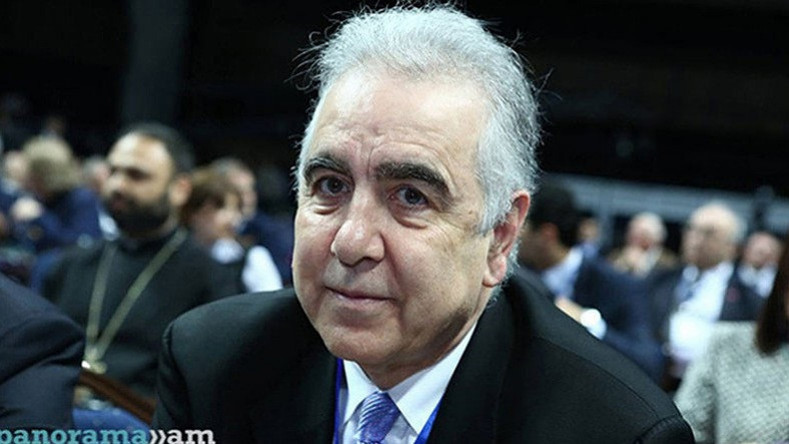
Israel's foreign minister tweets the term Armenian Genocide: 'Too little, too late'
By Harut Sassounian
Publisher, The California Courier
Israel’s Foreign Minister Israel Katz reminded Pres. Recep Tayyip Erdogan of the Armenian Genocide after the Turkish leader supported South Africa’s complaint with the International Court of Justice (World Court) that Israel was committing genocide against the Palestinians in Gaza.
Foreign Minister Katz tweeted on January 12, 2024: “The president of Turkey Erdogan, from a country with the Armenian genocide in its past, now boasts of targeting Israel with unfounded claims. We remember the Armenians, the Kurds. Your history speaks for itself. Israel stands in defense, not destruction, against your barbarian allies.”
Within the larger context of the Israel-Hamas conflict, Israel’s reference to the Armenian Genocide to attack Turkey raises a number of important issues. After refusing for decades to acknowledge the Armenian Genocide, Israel’s Foreign Minister all of a sudden remembered the Armenian Genocide when it suited his country’s interests. Here are my comments on his tweet:
1) Israeli Foreign Minister’s reference to the Armenian Genocide cannot be considered a formal recognition which can only occur when the Israeli Parliament (Knesset) adopts a resolution acknowledging the Armenian Genocide.
2) This is not the first time that an Israeli Minister has referred to the Armenian Genocide. Three other past Israeli Ministers had made similar acknowledgements when they were serving in the government:
-- Minister of Education Yossi Sarid stated on April 24, 2000, “I join you, members of the Armenian community, on your Memorial Day, as you mark the 85th anniversary of your genocide. I am here, with you, as a human being, as a Jew, as an Israeli, and as Education Minister of the State of Israel.”
-- Minister of Justice Yossi Beilin stated on April 24, 2000: “Something happened that cannot be defined except as genocide. One-and-a-half million people disappeared. It wasn’t negligence, it was deliberate.” Earlier, when serving as Deputy Foreign Minister in 1994, Beilin made a similar statement on the Armenian Genocide.
-- Minister of Immigrant Absorption Yair Tsaban attended the Memorial Day ceremonies of the Armenian community in Israel in 1995 and urged the recognition of the Armenian Genocide.
3) Nevertheless, Israel’s Knesset attempted several times in recent decades to adopt a resolution to recognize the Armenian Genocide. Each time, the government of Israel blocked the resolution to appease Turkey.
4) It is unacceptable that Israel is using the Armenian Genocide as a bargaining chip in its problematic relations with Turkey. The State of Israel, as a nation of Holocaust survivors, should have been the first country, hopefully not the last, to recognize the Armenian Genocide.
5) Equally unacceptable is the Israeli government’s excuses for its denial of the Armenian Genocide. When relations are good between Israel and Turkey, Israeli officials say: “We don’t wish to ruin our good relations with Turkey because of the Armenian Genocide.” And when the relations are bad, as it is now, Israel declares: “We do not want to make our relations with Turkey worse by recognizing the Armenian Genocide.” Israel has thus tarnished its reputation in the international community as a genocide denialist.
6) Contrary to the Israeli government’s denialism, individual Jews have been some of the leading voices calling attention to the Armenian Genocide: Henry Morgenthau, U.S. Ambassador to the Ottoman Empire (1913-1916); Franz Werfel, Austrian Jewish novelist, author of: “The Forty Days of Musa Dagh”; Raphael Lemkin, Polish Jewish Lawyer, who coined the term genocide; Reuven Rivlin, former President of Israel when he was the Knesset Chairman; Professors Israel Charny, Yair Auron, and Yehuda Bauer; and Nobel Peace Prize Winner Elie Wiesel.
7) For years and more recently, Erdogan has used very harsh words to insult the Israeli government and Prime Minister Benjamin Netanyahu, likening him to Hitler, and accusing him of being a ‘war criminal and terrorist’ who is committing genocide against the Palestinians. However, as in past conflicts, when the current crisis is over, Israel and Turkey will return to their earlier lovey-dovey relationship. Even at the height of this existing hostile situation, the two countries have continued their billions of dollars of trade, exchange of intelligence, and tourism.
8) Western Europe and the United States, by ignoring the Turkish leader’s misdeeds within NATO and his warmongering in several regional conflicts, have spoiled Erdogan to such a degree that he knows he would be able to get away with anything he wanted to do without facing any consequences. Back in 2010, when a Turkish humanitarian flotilla was approaching Gaza to break Israel’s blockade, Israel’s military attacked the Turkish ship killing 10 Turks. Thereafter, Netanyahu issued an apology to Erdogan and paid $20 million in compensation to the victims’ families.
9) Even if Israel recognizes the Armenian Genocide, Armenians will not forget the billions of dollars of lethal weapons that Israel sold to Azerbaijan to kill and injure thousands of Armenian soldiers during the Artsakh War. Shockingly, even in the midst of the Israel-Gaza war, Israel has continued to sell additional sophisticated armaments to Azerbaijan, as several Azeri cargo planes have been seen leaving Israel loaded with such weapons.
The “Israel Hayom” newspaper published on January 14, 2024, an article by Nadav Shragai, titled: “Recognize the Armenian genocide now.” The author boldly wrote: “The Israeli government's refusal to acknowledge the Armenian genocide is a clear case of blatant moral bankruptcy.”
Back in 1989, when Netanyahu was Deputy Foreign Minister and had not yet lost his moral compass, had said: “There are issues that go beyond politics and diplomacy. Genocides are a clear case of this particular category.”
Related news
Newsfeed
Videos






























